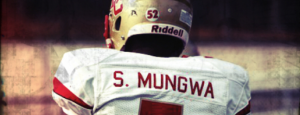 Take some time to talk to with Shutang Mungwa and it’s like speaking with a psychology teacher. The Syracuse student peppers interesting vocabulary into the conversation while discussing how reality is constantly changing, like the scientific matter surrounding us. Minute by minute, in fact second by second, the atoms in and around each of us alter form. This is how the unique mind of an aspiring rapper thinks. But not every rapper thinks outside the box like Shu does.
Take some time to talk to with Shutang Mungwa and it’s like speaking with a psychology teacher. The Syracuse student peppers interesting vocabulary into the conversation while discussing how reality is constantly changing, like the scientific matter surrounding us. Minute by minute, in fact second by second, the atoms in and around each of us alter form. This is how the unique mind of an aspiring rapper thinks. But not every rapper thinks outside the box like Shu does.
On a typical day on the Hill, Mungwa rises each morning with hundreds of novel verses whizzing through his mind. He‚Äôll make some music in the morning, go to class for a bit, continuing to pursue a degree and possible Ph.D in psychology. He’ll wander around with his Beats headphones, walk back home and make some more music. This has been his passion ever since he was a teenager growing up in New Jersey.
“I’ve always been into music, messing around with virtual software that plays music [on my computer]. It came to a point where if I really wanted to do music and enter that arena, I had to devote 110% of my time to it. Just like I did with football.”
The football route didn’t work out at Syracuse for Mungwa. After committing to the Orange in 2011, he spent one injury-riddled season playing for Doug Marrone, before leaving the program the following year. It was one of the toughest decisions of his life for the former Bergan Catholic standout. But he always trusted his instincts.
“It was a business decision. Music lasts longer than football because at any given moment your career could be over, and that’s it. I figured it was a better economic choice to do the music over the football. I couldn’t do [football the way it] made me comfortable. But music, there is nobody telling me what to do. I can do that to the best of my ability because I can always do the way I feel is best for me.”
For the last couple years Shu has launched his own personal rap brand, and aspires to be an accomplished musician down the road. He records and produces his own content day after day, modeling his work off some of his favorite rappers. Mungwa wants to make it to the top the right way by not concerning himself with record labels or big names. Because for him, the main goal is creating good content.
“I’ve always been about quality music first because as long as you’re making quality music, you’ll be ok. For anything you do in life, sometimes people taste the success and then they forget what got them there, and they lose sight of what got them there in the first place. My goal every day is to be in the studio, and whether I’m doing 16 verses or doing a whole song, I ask how can this be the best possible work I can come up with?”
He admits he takes in the world and his surroundings a bit differently than others. That’s how he expresses himself so distinctively. It’s been that way since growing up as a child in the West African country of Cameroon. Mungwa lived there until the age of 8.
“You would look outside, and you didn’t see a lot of possibilities. There are not a lot opportunities to do a lot of different things. What was great about my transition coming from Africa to the US, was that I was old enough to notice a difference in both environments. The first thing I noticed about [the US] was there is an infinite amount of things you can do.”
Those first eight years across seas for Mungwa were tough.
“I remember going to the store one day as a kid. My dad gave me a little money so I ran to the store to buy two pieces of bubble gum. Where I come from, as a kid, if you had candy you were the man. So I bought the gum with a friend of mine, and we were crossing the street to go home, and a taxi driver almost hit me. So he swerved, was upset and got out of the car. My friend took off, and I tried to run too, but the guy caught me, and he beat me up right in front of everybody. Then he got back in his taxi and left. That’s how crazy it was [in Cameroon].”
There were plenty of these stories before he and his family moved to Washington D.C. with just the clothes on their backs and a few suitcases containing their most valuable items. His mother Alice traveled very frequently while working for the United Nations. His father Martin taught constantly at the Cameroon’s major University, Polytechnique de Yaoundé. Mungwa always admired his parents’ strength, and their work ethic motivated him to succeed when they reached the US.
He did not have much in Africa, nothing was handed to him. Some would have called his first few years in America just as difficult, bouncing around different areas trying to settle down before finding a home in Oradell, NJ at the age of 12, but he had already been through the worst. He has always preached simplicity in his life.
The decision to play football was pretty simple. In middle school, his closest friend brought him to a football practice and on his first ever play, he bowled over the offensive tackle and sacked the QB. He was naturally athletic, having always grown up outdoors and staying active in Cameroon.
The decision to come to Syracuse was pretty simple, too. Months before he signed his letter of intent in February of 2011, former Stanford Head Coach Jim Harbaugh was shaking hands with the star safety, telling him he was his man. But SAT scores in the 1700’s and a GPA of nearly 3.8 apparently wasn’t enough for the Cardinal at the time.
“To this day, I still have no idea what happened, because no one from Stanford even talked to me personally. They called up my parents, and said ‘he didn’t get in because of grades,’ and that was it they hung up.”
Keep it simple, he thought. Mungwa expressed no ill will, didn‚Äôt question Stanford. “Now I‚Äôll go to Syracuse,” he said.¬†



















